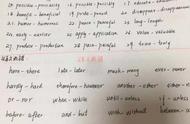
很多朋友经常会被混淆Can 和 Could这两个词,该用CAN的时候用成了COULD,或者该用COULD的时候用成了CAN。
今天就讲讲这两个词的不同用法:
1.表示能力
(1) 表示现在的能力,用can。如:
My sister can drive. 我妹妹会开车。
Everyone here can speak English. 这儿人人会说英语。
(2) 表示将来的能力,通常不用can,而用be able to的将来时态。如:
I’ll be able to speak French in another few months. 再过几个月我就会讲法语了。
但是,若表示现在决定将来是否有能力做某事,则可用 can。如:
Can you come to a party on Saturday? 星期六有个聚会,你能来吗?
(3) 表示过去的能力,若表示过去一般的能力,即想做某事就可做某事的能力,可以用could。如:
She could read when she was four. 她4岁的时候就能看书了。
My father could speak ten languages. 我父亲从前会说10种语言。
但是,若要表示过去通过努力而获取的能力或在过去特定情况下所具备的能力,则通常不用could,而用be able to的过去式或用managed to。如:
I tried again and found I could swim I was able to swim. 我经过再次努力,就发现自己会游泳了。
Only by shouting was he able to make himself heard. 他只有叫喊才能让别人听到他。
He was very ill for a time, but he managed to pull through. 有一段时间他病得很重,但他最后痊愈了。
(4) 用could表示过去特定能力的几种特例:
① 在肯定句,我们不能用于could表示过去特定情况下的能力,但在否定句中却可以,即couldn’t和wasn’t able to可以互换。如:
I couldn’t [wasn’t able to] finish the job yesterday. 昨天我未能把工作做完。
比如下面一句,前面的分句为肯定式,故用了managed to,但不能用could;而后面的分句由于是否定句,故可用couldn’t,当然换成wasn’t able to也可以:
I managed to find the street, but I couldn’t find her house. 我想法找到了那条街,但是找不到她的房子。
② 与see, hear, taste, feel, smell, understand, remember, guess等动词连用时,could可以表示某人在过去某个场合做了某事。如:
Can you smell something burning? 你能闻见什么东西的糊味吗?
I could understand everything she said. 她说的事情,我都明白。
③ 与only, hardly等表示限制或否定意思词语时,could有时可以表示过去特定场合的能力。如:
I could only get six eggs. 我只弄到6个鸡蛋。
She could hardly believe her eyes. 她简直不敢相信自己的眼睛了。
④ 在虚拟语气中,有时可以用could表示过去特定场合的能力。如:
You could get a better job if you spoke a foreign language. 要是你会说一种外语,那你就会找到更好的工作。
⑤ 在某些从句中,有时可以用could表示过去特定场合的能力。如:
I’m so glad that you could come. 你来了,我非常高兴。
I’m so happy that you could visit us. 我很高兴你能来看望我们。
⑥ 在间接引语中,我们可以用could表示过去特定场合的能力。如:
He said he could see me next week. 他说他下周能见我。
Your mother said that I could play here today. 你母亲说了,我今天可以在这里玩。
(5) can的省略:当谈到说某种语言的能力或者弹乐器和玩游戏的能力时,常常可以省略can。如:
She speaks Greek.=She can spark Greek. 她会讲希腊语。
Do you play the piano?=Can you play the piano? 你会弹钢琴吗?

2.表示允许
(1) 对于现在或将来的“许可”,要区分以下两种情况:
① 表示请求允许(即请求别人允许自己做某事),可用 can (=may) 或could (=might) (注意:这里的 could 并不表示过去,而是表示现在,只是语气较委婉)。如:
Can [May, Could, Might] I borrow your umbrella? 我能借用你的雨伞吗?
② 表示给予允许(即自己允许别人做某事)一般只用 can (=may),而不能用 could 或 might。如:
A:Could [Can] I use your pen? 我可以借用你的钢笔吗?
B:Yes, of course you can. 当然可以。(注意:此处不用 Yes, you could)
(2) 对于过去的“许可”,也要区分以下两种情况:
① 表示过去一般性允许(即表示某人随时都可以做某事),用 can的过去式(即could)。如:
When I was a child, I could watch TV whenever I wanted to. 我小的时候,想什么时候看电视就什么时候看电视。(一般性允许)
② 表示过去特定的允许(即表示在过去某一特定情况下允许进行某一活动),则不用 could, 而需换成其他表达(如had permission或 was [were] allowed to)。如:
After questioning he was allowed to go home. 经过问讯后,他得到允许,可以回家。(特定的允许,所以不能用could)

3.表示推测
(1) can表示推测时通常只用于否定句或疑问句中,一般不用于肯定句。如:
What can he possibly mean? 他可能是什么意思呢?
There’s somebody at the door. Who can it be? 门口有人,能是谁呢?
That can’t be his mother—she’s not old enough. 那一定不是他母亲——她年纪还不够大。
但是,could 表示推测时可用于肯定句中,并且此时它并不表过去。如:
It could rain later this evening. 今晚晚些时候也许会下雨。
Pandas could become extinct in the wild. 野生熊猫有可能灭绝。
You could be right, but I don’t think you are. 你可能是对的,但我并不认为你是对的。
(2) can 有时也用于肯定句中表示推测,这主要见于以下情形:
①表示理论上的可能性,即从理论上或逻辑上分析是可能的,但实际未必会发生。如:
Strikes can happen at any time. 罢工随时都可能发生。
Even an experienced climber can get into trouble. 那怕是个有经验的登山者也可能陷入困境。
② 后接“be, get, seem, become 形容词”,表示“有时会”“时常会”等义。如:
Canoeing can be a lot of fun. 划独木舟可以非常带劲儿。
When he’s roused he can get very angry. 要是惹着了他,他有时大发脾气。
③ 与only, hardly, never等表示限制或否定意思词语时,can也可用于肯定句中。如:
A:Who’s that at the door? 门外是谁呀?(www.yygrammar.com)
B:It can only be the postman. 只能是邮递员。(can only与must相似)
(3) 对过去情况的推测,应在can, could 后接动词的完成式,而不能只接动词原形。












